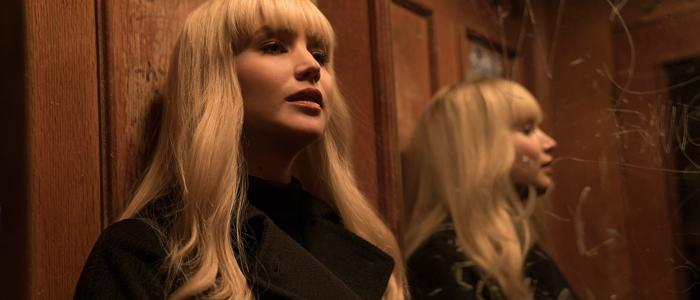How Jennifer Lawrence Reclaims Power in ‘Red Sparrow’
“Power, that’s what he wants,” observes Jennifer Lawrence’s Dominika Egorova in Red Sparrow as she stands confidently bare before her Sparrow trainees. She’s just humiliated an aggressive male in the group and her former would-be rapist. Soon after foiling the attempted assault in a shower, Dominika disrobes at the front of the class and goads her assailant to finish his deed consensually. Try as he might, the classmate can’t get it up. With her unabashed preening, Dominika reveals the impotency of those who attempt to corral her sexuality for their own pleasure – not unlike Lawrence herself these days.
Love her or loathe her, Jennifer Lawrence is a millennial icon and trailblazer – among the first of her contemporaries to win an Oscar as well as carry a major Hollywood franchise on her shoulders. She’s a truly unique cultural creation: combining a beguiling screen presence with a guarded private life, but exuding accessibility and authenticity rather than mystery and artifice. Lawrence is not a star because she’s better than us. She’s a star because she’s one of us, a fitting reflection for the ethos of a generation that grew up self-actualizing on screens and now must figure out how to transition into adulthood.
As Red Sparrow opens, it’s instructive to observe yet another chapter of her career as she both navigates and rewrites modern stardom. From her unique position having conquered the commercial and prestige corners of the film industry, Lawrence has the ability to reflect our society’s values while also helping to shape them. This applies to an even greater extent in matters regarding gender, sexuality and self-presentation. In the midst of an unfinished gender revolution, Lawrence confronts an amplified version of the dilemmas presented to many women in America and across the developed world. How much can a patriarchal society bend before it breaks? At what point does female strength become threatening to men? How do we gender traits like assertiveness and confidence? How do women exude sexuality for self-empowerment, not merely to feed a male gaze?
This tension has been evident for Lawrence from the very beginning, both in her on-screen appearances and the publicity surrounding them. Take, for example, her 2010 Esquire profile, an introduction the budding starlet for the vast majority of people who did not see her critically acclaimed – and soon to be Oscar-nominated – turn in the low-budget indie Winter’s Bone. That’s not just conjecture, by the way; Lawrence has publicly credited the steamy spread with helping her land the role in the X-Men franchise. In an article to accompany her suggestive shoot, journalist David Katz notes that her publicist in the room is actively selling Lawrence as someone who can sell a flashy pictorial spread, not just a line reading. (The advice of publicists, with Lawrence usually running in the complete opposite direction, is a regular occurrence in her profiles.) “I’m excited to be seen as sexy,” Lawrence told Katz. “But not slutty.”
Two Career Tracks
Where is that line between the suggestion of sexuality and the outright flaunting of it? Lawrence explored the boundaries on the two parallel tracks of her career. On one, she became a muse for writer/director David O. Russell playing sexually developed adult women. A defining facet of her Oscar-winning role as Tiffany in Silver Linings Playbook is her sleeping with everyone in her office after becoming widowed, while her scene-stealing Rosalyn in American Hustle regularly uses seduction as a cudgel to get her way with her husband.
On the other track, Lawrence starred as the teenage protagonist of The Hunger Games, Katniss Everdeen. Though she looked much older than her character’s 16, the choices Katniss faced resembled Lawrence’s own as a public figure – how to use a platform to make the powerful quake, how dressing and performing for the camera could shift opinion, how the fate of her body was ultimately in the hands of others who understand that by consuming images of it, they had become partial owners of it.
The relevance of the latter became especially apparent for Lawrence in the fall of 2014, when hackers posted nude images of her online that were intended for her then-boyfriend Nicholas Hoult. She later described the experience as akin to being “gangbanged by the f—ing planet.” The violation she suffered is one of the digital era’s most extreme cases of privacy violation, a moment shattering any illusions that the most intimate content could not at once become private without the permission of the people it concerned. In her 2014 Vanity Fair cover story, Lawrence described the conflicting reactions she had to the incident. “I started to write an apology,” she confessed to journalist Sam Kashner, “but I don’t have anything to say I’m sorry for.” She knew that society expected her to respond in shame, yet Lawrence’s gut told her to reject the conventional wisdom of considering herself an unwitting accomplice in the scandal.
The cover shoot accompanying the article, appropriately titled “Both Huntress and Prey,” features a topless Lawrence with her private parts submerged under water. Perhaps the shoot occurred before the hacking incident – the interview process for the profile began prior – but Lawrence’s insistence on keeping it projects an image of defiance. She confidently owns her body and shows no shame in its nudity, yet she chooses to conceal the portions shown without her permission. She owns the distribution of images of her body once again. She decides how she will be portrayed.
Continue Reading How Jennifer Lawrence Reclaims Power in Red Sparrow >>
The post How Jennifer Lawrence Reclaims Power in ‘Red Sparrow’ appeared first on /Film.
from /Film http://ift.tt/2tdSObC


No comments: